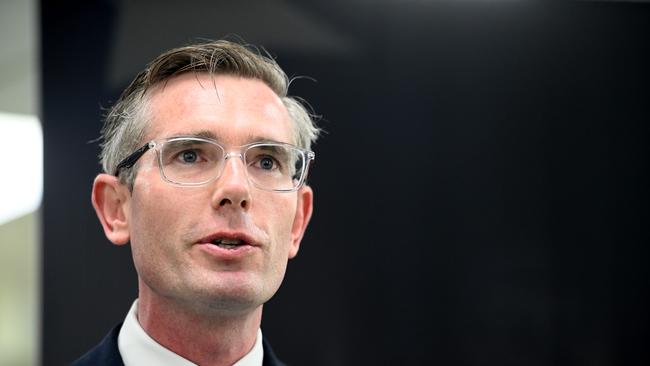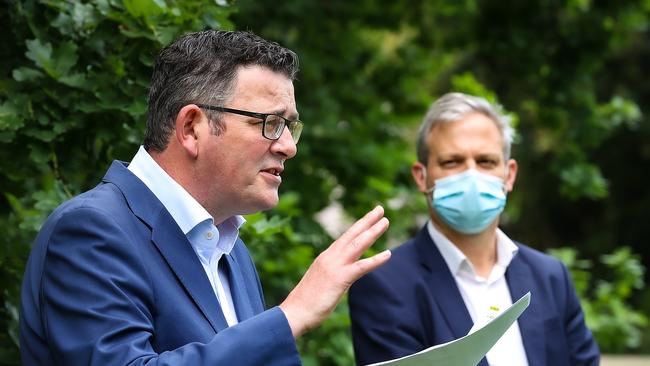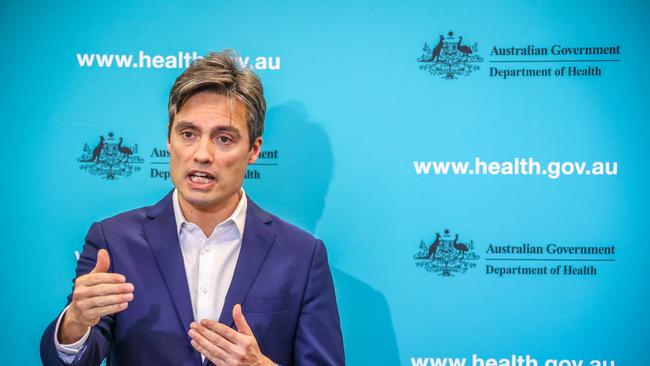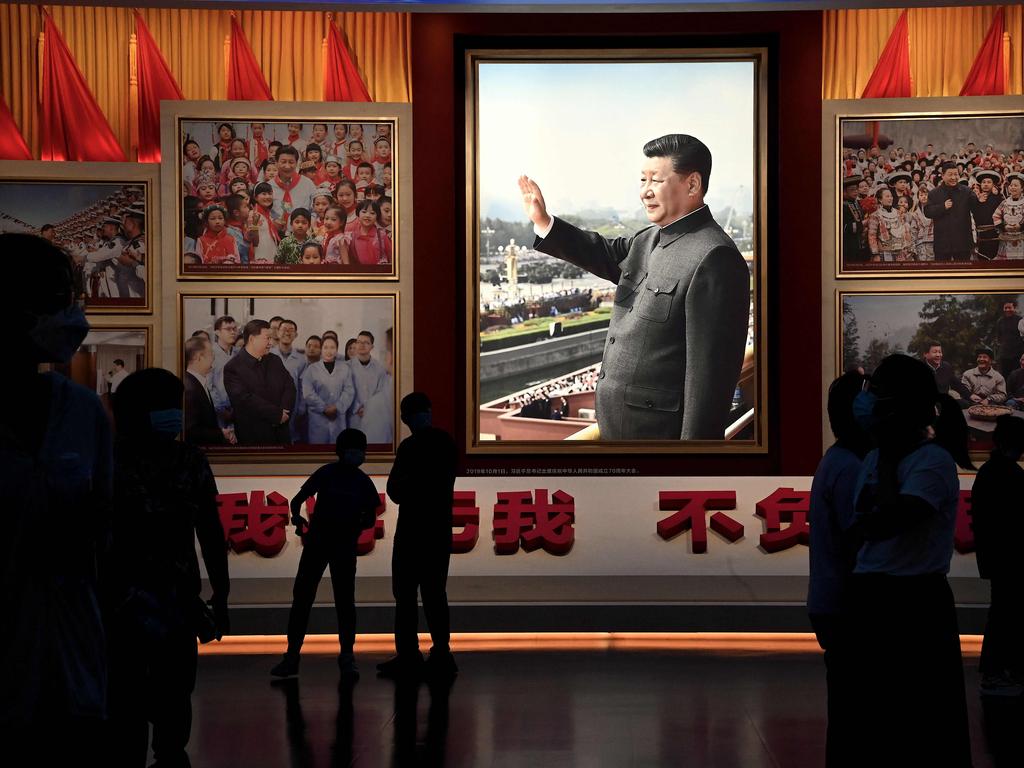Why Covid-19 is not an isolated issue
The pandemic’s final frontier is already dividing state governments and medical experts. Now could be the right time to have the debate about mandatory isolation.

The issue is already dividing state governments and medical experts along the now familiar fault lines between the pro-restriction (and formerly pro-lockdown) advocates and the live-with-Covid voices.
The debate is being driven by falling Covid infections and deaths, a crippling national workforce shortage and growing support for fewer restrictions, with the national cabinet last week reducing isolation requirements for those with the virus from seven days to five.
“It is time to have this debate,” says Nick Coatsworth, Australia’s former deputy chief medical officer. “But the problem is that it is being stifled by the false dichotomisation of this being a health versus economy discussion.
“It’s not at all. It’s a public health discussion on whether it is a reasonable and proportionate response to keep people isolated for five days at this point of the pandemic.
“And there is clearly an argument that zero days isolation is a credible public health policy option because many countries in the world are doing it.”
The idea of completely scrapping mandatory isolation for those with Covid is being pushed at a political level by NSW Premier Dominic Perrottet, who says it should be done “as soon as possible”. His argument is that people should still isolate themselves when they have Covid but that this should not be a government edict.
“I believe we need to move away from public health orders, we need to move … to a system in which we’ll respect each other – if you’re sick, you stay at home, if you’re not sick go to work,” Perrottet said.
“The state should not be enforcing these orders at this time in the pandemic.”
NSW government modelling estimates the total cost to the state’s economy of people missing work because of Covid-19 and Covid restrictions is $900m a year.
Perrottet is being backed by Health Services Union national president Gerard Hayes, who also says it is time to move away from mandatory restrictions towards greater personal responsibility.

“We’re starting to see life return to normal and I think that includes ensuring that we treat Covid as we would treat the flu, measles or anything else. And if people are infectious, they should be staying at home,” Hayes says.
“I think the medical experts have done a fantastic job getting us here but so has the community.
“We’re seeing the community suffering, people trying to put food on the table and comply with regulations. We need to get to a point of personal responsibility.”
But these calls for an end to mandatory isolation have sparked fierce debate among health experts about what it would mean and whether it would trigger another Covid wave of infections and deaths.
Victoria’s chief health officer Brett Sutton, who presided over Melbourne’s record lockdowns in 2020 and 2021, has lashed out at the idea.
In written advice to Victorian Premier Daniel Andrews, Sutton says that without mandatory isolation and other remaining measures “there would be a substantial and sustained increase in cases, hospitalisations and deaths in Victoria from current and future waves”.
He is backed by more cautious medical voices including the Australian Medical Association and the head of the University of Melbourne’s school of population and global health, Nancy Baxter, who says there is “no scientific basis” to reduce or scrap mandatory isolation.
“So why make the change now?” Baxter wrote in The Conversation this week. “Perhaps the hope is that while we are experiencing reduced transmission due to the large number of people recently infected with Covid, easing our protections will not lead to an immediate increase in cases.
“In this confidence trick, politicians can make these changes with no apparent impact.”
Baxter added that “our systematic dismantling of all existing protections will make the next wave come on sooner and affect more people”.

But will it? The debate over the likely impact of scrapping mandatory isolation is a messy one, with little concrete evidence to support either side. “People like the AMA have been bad-faith actors here because they know – and every scientist who claims that there is some pure definition of what to do here also knows they are lying,” says Coatsworth.
Catherine Bennett, Deakin University’s chair in epidemiology, says some health experts are “cherry picking” evidence to suit their own bias on the question of Covid isolation periods.
“There is a lot of variety in the studies, such as when they are done, when they are published, what population they are looking at, what’s been analysed,” she says.
“You can piece together a terrible story and you can piece together a great story.”
The debate comes as Covid is on the retreat across the country. Since the peak of the winter outbreak in late July, Covid infections have dropped from a daily average of 47,000 to just over 9000 while hospitalisations have almost halved from 5361 to 2752 and deaths have fallen from an average of 91 a day to 44.
The main argument used to oppose the scrapping of mandatory isolation is that too many people would act irresponsibly by flouting the health advice to stay home until they are symptom free and instead would move freely in the community, therefore potentially spreading the virus. This would occur when they are most likely still infectious, thereby fuelling the spread.
Sutton says surveys show that only one-third of those who recently isolated for seven days with Covid would have done so if it were no longer mandated.
But in Sutton’s own report to Andrews he concedes there is currently very little compliance with the mandatory reporting and isolation rules anyway – a fact that would greatly limit the impact of lifting those rules.
Sutton says that in early to mid August, surveys showed “a quarter of respondents did not get tested for Covid-19 while experiencing symptoms and a third of respondents did not report their positive RA test result to the Department of Health. Furthermore, almost a quarter of respondents were unaware of the current case isolation requirements.”
Bennett believes Sutton is overplaying the effectiveness of mandates on people’s behaviour at this stage of the pandemic.
“The common thread throughout the CHO (Sutton) report was the sentiment that we need mandates to get compliance but in the same document he talks about the lack of effectiveness of mandates, for example with masks on public transport.”
The other contentious issue is the infection risk posed by scrapping mandatory isolation altogether.

Those who support maintaining a minimum of five days of mandatory isolation point to a recent study by the Imperial College London of 57 Covid-positive people that found two-thirds were still infectious five days after their symptoms began.
But Bennett says the study also shows that those who were still deemed infectious after five days had a sharply lower infectious viral load and that the study related to the Delta variant “so we don’t know how it applies to Omicron”.
Bennett says that even with mandatory isolation, people with Covid are already spending more time infectious in the community than they do in isolation because so many are infectious before developing symptoms.
She estimates that, at the most, mandatory isolation removes only a quarter of the exposure days of a Covid-positive person and is “probably much lower than that”.
Bennett supports the recent reduction in isolation from seven days to five and believes further reductions make sense “if we give it a bit of time and if we don’t see any massive change (in infections)”. She says any move to reduce or scrap isolation must be accompanied by a major education campaign about ways to minimise risk.
But she is critical of those experts who are alarmist about the risks of reducing isolation further, saying they are basing their views on poor and incomplete evidence and are whipping up fear in the community.
“We have to keep people out of a state of paranoia,” she says.
“I have people ringing me who are so stressed because they are so fearful about this, and it’s really sad to see. Yes, we need to manage infection control, but terrifying people is not the way to do it.’’
Both the AMA and Baxter claim that reducing or scrapping mandatory isolation will do little to solve the labour shortage and workforce disruptions because more people will infect others in the workplace.
“There will be an increase of infections in workplaces and schools due to the shortened isolation (from seven days to five),” Baxter says. “When our next wave comes this will result in even more people being furloughed because they are sick with Covid or caring for others, defeating the ultimate purposes of the change.”
It’s a claim that business rejects.
“Reducing isolation rules from seven to five days for those without symptoms will be critical in further alleviating the acute workforce shortages across the economy,” Australian Chamber of Commerce and Industry chief executive Andrew McKellar says. “With businesses recording worsening staff absences, this change will enable more employees to return to work earlier, ensuring businesses can keep their doors open and keep the economy moving.”
One of the more dubious claims in the debate over mandatory isolation is Sutton’s claim that evidence from overseas indicates that ending mandatory isolation leads to significantly higher Covid infections.

He cites the example, in his August 29 report to Andrews, of Britain, which ended mandatory isolation in late February. Sutton primarily blames that decision on the second Omicron wave in Britain from March to April in which infections and deaths rose.
But that Omicron wave would have led to higher infections and deaths regardless of Britain’s isolation policy.
Sutton fails to mention that, since then, Covid infections in Britain have plunged from around 87,000 a day to 8700, while deaths have fallen from almost 200 a day to 84 and hospitalisations have more than halved. In other words, Britain’s overall experience since scrapping mandatory isolation has been far more positive than negative.
Australia’s decision to reduce the days of isolation from seven to five is broadly in keeping with most of Europe and the US.
Coatsworth says Australia should now consider following Britain’s lead in scrapping mandatory isolation completely.
“Well over 50 per cent of the population have had this virus and over 95 per cent have been vaccinated against it,” he says.
“There is a rational public health argument to reduce it to five days and then to zero days based on the fact that cases have decreased and the pressure on the health system is reduced. We would be in a much better position if we went to zero days isolation with a very strong public education campaign about staying at home when you’ve got symptoms and coming back to work when your symptoms are on the improve.
“So in short, we should move quickly to the standard message for all respiratory viruses that the federal government puts out.”
Anthony Albanese says the shortening of the isolation period from seven days to five is a “proportionate response at this stage of the pandemic”.
But the Prime Minister’s comments after the national cabinet meeting leaned more towards the Perrottet argument of greater personal responsibility than it did towards the need for indefinite restrictions.
“We had a discussion about people looking after each other, people looking after their own health and being responsible for that … there aren’t mandated requirements for the flu or a range of other illnesses,” Albanese said.
“Covid is likely going to be around for a considerable period of time.”
Says Coatsworth: “We can say with a fair degree of confidence that things are moving in the right direction and will continue going into summer and with lots of hybrid immunity. So there is no reason why we shouldn’t have this debate now. Even if we don’t do it now, why not have the conversation?”






The final frontier in the national debate over Covid-19 restrictions is looming, with growing calls for the scrapping of mandatory isolation for those with the virus.